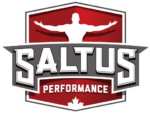It’s common to see teenage boys chasing big numbers in the gym, loading the bar as heavy as possible, grinding out slow reps, and measuring progress purely by how much weight they can lift. While maximal strength training might look impressive, developing athletes are often better off training with lighter weights that allow them to move faster and with better control.
Maximal strength training refers to lifting loads that are roughly 85–100% of your one-rep maximum (1RM) — think of a super heavy squat or deadlift performed for just one or two reps. Maximal strength reflects how much force you can produce, regardless of how quickly you produce it.
From a performance standpoint, this type of training reinforces slow, grinding contractions instead of the rapid contract–relax cycles that define sprinting, jumping, throwing, and powerful changes of direction. While maximal strength training can improve force output, overemphasizing it too early can actually make athletes slower and less explosive.
To build athleticism, teenagers should instead focus on developing explosive strength, which is the ability to produce high force in a very short amount of time. This quality is what separates good athletes from the absolute best. Explosive strength training typically involves loads between 30–80% of 1RM, allowing athletes to move fast and explosively through each rep.
It’s also important to understand why maximal strength training should be delayed earlier in development. It’s a specialized training stimulus that should be reserved for when an athlete’s natural rate of strength development begins to plateau, typically in the mid-20s. Before that, athletes continue getting stronger naturally through growth, coordination, and general training exposure. Saving maximal strength work for later makes it a powerful tool to break through plateaus and continue driving progress.
One of the challenges with explosive training is that it can feel less gratifying, it’s harder to “see” improvement when you’re lifting lighter loads. But in reality, this is where the best athletic transfer occurs.
Here are a few ways developing athletes can ensure they’re training in the explosive strength zone rather than the max strength zone:
- Prioritize full range of motion. Athletes chasing heavy weights often shorten their range to move more load. Training through full depth (for example, squatting to a medicine ball at or just below parallel) provides built-in feedback and reinforces good movement quality.
- Use exercises with high internal load, not just external load. Some exercises feel harder even with less weight. A front squat with 95 lbs can feel just as challenging as a back squat with 135 lbs as it’s not as biomechanically advantageous and is self-limiting in that it forces you to maintain proper posture in order to not drop the bar.
- Use a load that lets you ‘punch’ through the top. If you’re grinding the lift, it’s too heavy. Each rep should look sharp, fast, and snappy. If using a barbell, a good goal is to have the plates ‘jingle’ on the bar at the top of the rep. You should also feel like you have a minimum of 2-4 GOOD reps left in the tank at the end of your set.
- Measure bar speed. Using a velocity-based training tool such as Enode helps ensure every rep is performed fast enough to actually build speed and power, not just brute strength. Aim for bar speeds around 0.75–1.0 m/s to target accelerative strength and 0.5–0.75 m/s for strength-speed—fast enough to develop power, but heavy enough to build force.
At Saltus, our systems are designed to build the right type of strength at the right time. We develop the most explosive, durable athletes in Vancouver who are set up to achieve their full genetic potential without plateauing early.
